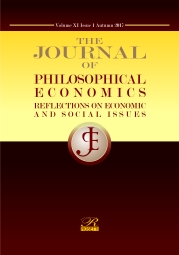More than a sum of its parts: A Keynesian epistemology of statistics
More than a sum of its parts: A Keynesian epistemology of statistics
Author(s): Nicholas WerleSubject(s): Philosophy, Social Sciences, Economy, Special Branches of Philosophy, Sociology, Philosophy of Science, Social Theory, Socio-Economic Research
Published by: Editura Rosetti International
Keywords: Keynesian macroeconomics; probability; uncertainty; physics; econometrics;
Summary/Abstract: The major theoretical insight of Keynes’ General Theory is that aggregate quantities describing the state of an economy as a whole are irreducible to arithmetic summations of individual decisions. This breaks with the logic of classical political economy and establishes macroeconomics as the study of economy-wide dynamics, logically independent from any underlying theory of individual rationality. However, Keynes does have a theory of individual psychology that links expectations back up to aggregate quantities with robust statistical methods, which account for the fundamental uncertainty one faces in predicting the future. By comparing the theoretical structure of macroeconomics to that of thermodynamics and statistical mechanics, this essay proposes a novel reading of Keynes’ epistemology of statistical laws. On this view, statistical methods allow theoreticians to connect the mechanics of vast numbers of micro-scale entities to a macro-scale dynamics, even in the absence of a fully determinate causal story. Keynes’ belief that organic wholes emerge from the interactions of complex systems is a product of his early work on the development of statistical mechanics from kinetic theory. In light of this epistemological foundation, this essay shows how the neoclassical idea of supplying macroeconomics with microfoundations is inherently contradictory
Journal: Journal of Philosophical Economics
- Issue Year: IV/2011
- Issue No: 2
- Page Range: 65-92
- Page Count: 28
- Language: English

